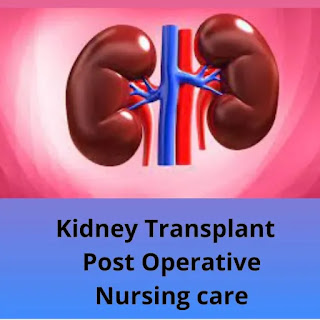Kidney Transplant
Kidney transplantation is placement of a donor kidney ( from sibling, parent, cadaver) into the iliac fossa of a recipient and anastomosis of its ureter to the bladder of the recipient. It is indicated in end stage renal disease.
Criteria for kidney transplant recipient :
Recipient should be :
- recipient should be under 70 year of age
- patent and functional urinary tract
- Free of serious cardiovascular complications
kidney transplant Donor selection :
- Sibling or parent : survival rate of kidney is greater, preferred for transplantation.
- Cadaver : Greater rate of rejection following transplantation.
Bilateral Nephrectomy :
- Necessary for patient with rapidly progressive glomerulonephritis, malignant hypertension, or chronic kidney infection , prevents complications in transplanted kidney
Kidney Transplant Nursing Diagnosis
1. Altered Urinary elimination related to kidney failure
2. Fear related to potential transplant rejection
3. Risk of infection related to immunosuppression
4. Body image disturbance related to immunosuppression
5. Pain related to surgical Incision
Pre operative Nursing care for kidney transplant
A. Goal : Promote physical and emotional adjustment
- Informed consent
- Lab work completed – Histocompatibility, CBC, Urinalysis, blood type and cross match
- Skin preparation
B. Goal : Encourage expression of feelings : origin of donor, fear of complication , rejection.
C. Goal : Minimize risk of organ rejection :
- Give medication , begin immunosuppression
Kidney Transplant Post Operative Nursing Care
1. Promote uncomplicated recovery of recipient :
- Monitor Vital signs , CVP, Input and output chart
- Urine out starts immediately with living donor and late in cadaver donor
- Report less than 100 ml/hr immediately.
- Isolation: strict reverse isolation with immunosuppresion
- Indwelling catheter care using strict aseptic technique.
Position : Post operative position to kidney transplant patient to back to nonoperative side or semi fowler`s position to promote gas exchange.
- Ambulate patient 24 hours after surgery, avoid prolonged sitting
- Weigh patient daily
- Diet: regular diet after return of bowel sound , liberal amount of protein, restrict fluids,sodium, potassium only if oliguric.
2. Observe for Sign of rejection – most dangerous complication
Types of kidney rejection
A. Hyperacute : occurs within 5 to 10 min upto 48 hours after transplantation
B. Acute : Most common 7 to 4 days varies depending upon on living donor( 1 week to 6 month) or cadaver (1 week to 2 years)
C. Chronic : occurs several months to years
Assessment of sign of kidney rejection
- Subjective Data
- Lethargy, anorexia
- Tenderness over graft site
- Objective Data :
- Lab data- Urine output decreased, decreased creatinine clearance and sodium
- Increased protein and Increased BUN and creatinine
- Rapid weight gain more than 3lb per day
- Blood pressure and temperature elevated
3. Maintain Immunosuppressive Therapy
A. Azathioprine : An antimetabolite that interferes with cellular division
Side effect :
- Gastrointestinal bleeding
- Bone marrow depression , leukopenia and anemia
- Development of malignant neoplasm
- Infection
- Liver damage
B. Prednisone : Believed to affect lymphocyte production by inhibiting nucleic acid synthesis, anti inflammatory action helps to prevent tissue damage if rejection occurs
Side effect :
- Stress ulcer with bleeding (Give with food )
- Hyperglycemia
- Muscle weakness
- Osteoporosis
- Moon face
- acne and striae
C. Cyclosporine : Used to prevent rejection of kidney
Side effect :
- Nephrotoxicity
- Hypertension
- Tremors
- Hirsutism, gingival hyperplasia
- Nausea, vomiting, anorexia, diarrhea, abdominal pain.
Also Read : Renal Disease Important points
